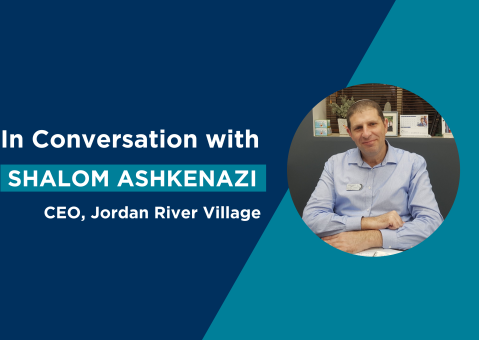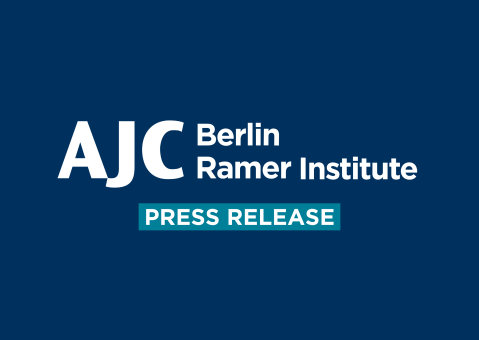Share on
This interview was first published at rnd.
The Hamas attack on October 7th changed everything in Israel. Remko Leemhuis, Director of the American Jewish Committee in Berlin, was recently there and reports in an interview on the atrocities committed against Jews by the terrorist militia. He also talks about the "glorification of terror" on German streets.
Moritz Speer
November 4, 2023
Remko Leemhuis is Director of the American Jewish Committee (AJC) in Berlin. His work focuses primarily on antisemitism, Islamism, and security policy issues. Among other things, he is committed to strengthening transatlantic relations and German-Israeli relations. He recently visited Israel with a delegation and saw the situation for himself, following the Hamas terror attack on October 7th. In an interview with RedaktionsNetzwerk Deutschland (RND), he talks about his impressions on the ground and Germany's role in Israel.
Mr. Leemhuis, you spent several days with a delegation in Israel. What did you experience there?
It began with the people who picked us up at the airport. Everyone in Israel knows people, at least indirectly, who have been kidnapped, murdered, or injured. The whole country is traumatized. We saw burnt-out houses in kibbutzim, bullet holes everywhere. Only when you go in there can you begin to imagine the absolute horror that took place on October 7th.
Can you describe in more detail what you saw in the houses?
Doors were riddled with bullet holes everywhere. In the rooms behind them, people who were hiding were murdered. Even weeks later, the stench in these houses is almost unbearable. You can also see how systematically the terrorists went from house to house and killed or kidnapped everyone. In one house there were children's puzzles on the floor and in another room, everything was covered in blood. This scene was completely surreal.
How did Hamas proceed there?
Documents have been recovered from dead Hamas fighters which show that they had a great deal of information. They knew who lived in which house, how many people were there, how many pets. It was all broken down in detail and planned far in advance.
You also visited a military base in Israel where bodies are identified. What are the difficulties involved?
So far, 300 people - mainly women and girls - have not been identified. Their condition makes it impossible. They were so badly mangled after they were murdered that they cannot be identified. To this day, body parts are still being found in the areas that were attacked. A few days before we visited one kibbutz, a baby was found in an oven there, having been burned to death. These stories are truly unfathomable.
How do you process these terrible impressions from your time there?
To be honest, I haven't found a way yet. It's all still too fresh. I feel like I don't have the language to put it into words. I've been working in this field for some years now and have experienced a few conflicts. But this surpasses everything. You can't prepare for this. Of course, I read a lot of reports and saw a lot of pictures before the trip. But being there myself was a completely different experience.
Israel has a long history of conflicts, crises, and wars. But the Hamas attack on October 7th was more violent and deadly than ever before. How has this affected Israeli society?
Personally, I have always resisted drawing parallels with the Holocaust. But almost every Israeli we have spoken to has drawn a comparison. That makes it clear what we are talking about here. People feel that they are no longer safe in Israel and question whether they should leave the country. But they don't know where to go. Because they don't feel safe anywhere.
Is there something that gives you hope?
Israeli society stands united and will continue to do so in the future. That is the most important thing. And I was deeply impressed by the fact that there is no sign of hatred anywhere. Nobody is saying: "You have to raze the Gaza Strip to the ground now." The Israelis always point out the difference between Hamas and the Palestinians. I don't know how I would react in such a situation. That gives me hope.
And what do the Israelis think about the possible outcome of the war?
Of course, it is clear to them that the war must be won, and that there can and must not be any further coexistence with Hamas after October 7th. People in Germany and the rest of Europe must also understand this: There can only be a peaceful two-state solution when Hamas no longer exists.
What is your view of the anti-Israel demonstrations in Germany since October 7th? There was a lot going on in Berlin-Neukölln in particular.
First of all, I would like to clearly state that these were not pro-Palestinian demonstrations. They were pro-Hamas demonstrations. Anyone who seriously wants to stand up for the rights of Palestinians and for a Palestinian state should demonstrate against Hamas. What happened in Neukölln was the glorification of terror and the distortion of an antisemitic mass murder.
The German government has been widely criticized for abstaining from the vote on a UN resolution calling for a ceasefire in Gaza. How is Germany's role seen in Israel?
The fact that the Chancellor and the Foreign Minister were on the ground so quickly was viewed very positively. But the abstention has now sent out the wrong signal. I saw Baerbock's interview, in which she defended the decision, and I have to say, I'm not convinced at all. The fact that Hamas welcomed this resolution should perhaps also give the Foreign Office pause for thought. Apart from that, however, Israel is well aware of Germany’s support. They are grateful for that.
Many Jewish parents are afraid to send their children to school right now. Many refrain from wearing a Star of David for safety reasons. What does that trigger in you?
To be honest, it's nothing new. But the fact that my Jewish friends don’t even send their children to Jewish kindergartens and schools any more, which are guarded and secured, is something I never experienced before. This is an absolute catastrophe. These people have to worry about their safety, and this terror-glorifying mob that takes to the streets does not. It's hard to bear.
On Thursday morning, Federal Minister of the Interior Nancy Faeser issued a ban on Hamas' activities and banned the pro-Palestinian network Samidoun. Does this measure come too late, in your view?
Of course that should have happened much earlier. But we welcome it in principle. For us, however, the ban on the Islamic Center Hamburg remains a priority. This is a direct outpost of the Iranian regime, which was also involved in these attacks. We have been campaigning for this for years. However, Ms. Faeser has issued other bans in recent weeks, which were also long overdue. We are very grateful for this.
Vice Chancellor Robert Habeck published a video statement on Wednesday evening, for which he was widely praised on social networks. Do you also see it as positive?
The clarity and at the same time the nuanced nature of his message was very impressive. It stands out from everything we've seen and heard so far. He struck exactly the right note. You can tell that it really moved him personally.



